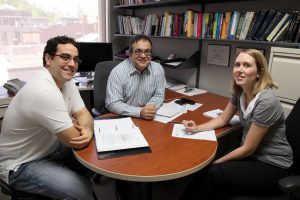By Philip Trum
Canada’s hospitals need smart managers. The Health care Operations and Information Management program is training them.

“There are still some research fields where you can be purely theoretical,” muses Vedat Verter, “but health care management isn’t one of them. You have to show relevance, you can’t just do your research from an office.”
Verter is a professor of operations management in the Desautels Faculty of Management at McGill. He’s also the program director of the NSERC CREATE-funded program in Health care Operations and Information Management, a new PhD and post-doctoral fellowship program that brings together expertise from McGill, the Université de Montréal, Queen’s and the Universities of British Columbia, Ottawa and Toronto. CREATE-HOIM’s goal is to train managers who can improve Canadian health care by tackling problems such as emergency room waiting times and accessibility to family physicians, or improve the use of state-of-the-art information and telecommunication technologies in the health sector.
The Canadian tradition of filling managerial roles with doctors, reasons Verter, just isn’t working—and not just because it cuts into a physician’s care-giving time. “These individuals are highly trained, excellent clinicians and very smart—but we won’t turn around our health care system by assuming that they’ll intuitively find the right ways to manage,” he says. “Other sectors don’t do this; aero space doesn’t only hire engineers, they hire managers to work with those engineers.”
CREATE-HOIM launched in September 2009, with six doctoral students and three post-docs. (This past June, a one-week summer school also attracted 30 trainees from Canada, the U.S. and Europe.) The program brings together research expertise in four disciplines: electronics and telecommunications, information systems and software architecture, operations research, and process design and improvement.
Paul Intrevado is a PhD student in health care operations research. After receiving his BCom from McGill, he completed a BSc and MSc in industrial engineering at Purdue University. While there, he saw his ideas for improving batch order preparation at the Wishard Hospital in-patient pharmacy in Indianapolis successfully implemented. The experience hooked Intrevado on creating academic work with concrete real-world applications. Back at his undergrad alma mater, he’s now serving as the student representative on the CREATE-HOIM Advisory Board. “It’s important that the aim of my research isn’t just to line the pockets of shareholders, but to contribute to the overall good,” he says. Intrevado is translating data gathered at Montreal’s Jewish General Hospital and Hôpital Notre-Dame into a dissertation about how the lack of various types of long-term-care facilities increases hospital stay times for older patients.
“Hospitals are data rich, but information poor,” says Wojtek Michalowski, CREATE-HOIM faculty member and professor of health informatics and decision support at the University of Ottawa. “They produce a lot of data but are very bad at extracting information out of this data. What the program is trying to accomplish is to train people who understand what they should know. We want to make people aware of what they don’t know, so they’ll use the data to get that information.
“If you want to find out how a system behaves, and you want to improve it, you have to develop some sort of model. Models provide new insights that can be used in evidence-based decision making.”
Although the program is in its first year, it’s essentially a formal continuation of a kind of collaborative research that’s been happening between the Desautels Faculty of Management and McGill’s affiliated hospitals for several years. (See sidebar.) In order to ensure interuniversity collaboration, each PhD student works with supervisors from two different schools, and participates in a weekly teleconference seminar with the other students across the country. A six-month to one-year exchange is also part of the training; for example, a Queen’s PhD student studying cancer-care relationships may spend a year at UBC working with collaborators at Cancer Care BC studying how to improve access to oncology departments.
There are still obstacles to overcome. Nurses and physicians may be rightly skeptical of outsiders arriving with fancy new ideas about how things should work. That’s why, says Verter, it’s essential to engage collaborators on the health care front lines in all stages of this research; the program includes a network of 40 health care providers and decision makers. “If they’re part of the work, and they’re impressed with a student’s research outcome, it increases the likelihood that the knowledge will actually be implemented.”
And implementation is CREATE-HOIM’s ultimate goal. “Over the next six years, we’re aiming to fund 15 doctoral students and five one-year post-docs—and we’re hoping the health sector will absorb at least 10 of those PhDs,” says Verter. “We want our graduates to work in the Canadian system.”
■The CREATE Health care Operations and Information Management training program is funded by the Natural Sciences and Engineering Research Council of Canada (NSERC).
